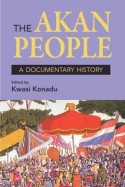 The 25-million-strong Akan, a cultural-linguistic group found predominantly in present-day Ghana and to a lesser extent Togo and Ivory Coast, has established a legacy as widely known as its bright kente cloth. From the fourth century on, the Akan created numerous states based largely on gold production, commerce linked to Sudanic Africa and the Mediterranean world, and an agrarian culture. Attracted by its gold, Europeans established their West African bases in the region they called the Gold Coast and built commercial relations with indigenous states like Denkyira and Akwamu. As these states gained wealth from regional and European commerce, gold was surpassed by the trafficking in African captives to be used in the overseas European colonies. Europeans established over 40 trading forts along 341 miles of the Akan coastline, underscoring the importance of the region. The lessons learned from the rise and fall of numerous Akan states ultimately led to the rise of the best-known Akan empire, the Asante Empire. Throughout its history, the Akan have been innovators of sophisticated socio-political organizations and in material culture, producing notables such as the pan-Africanist and Ghana’s first president, Kwame Nkrumah, and sub-Saharan Africa’s first U.N. Secretary General, Kofi Annan. This first-of-its-kind collection features a new array of primary sources that provide fresh and nuanced perspectives on the histories of the Akan peoples.
The 25-million-strong Akan, a cultural-linguistic group found predominantly in present-day Ghana and to a lesser extent Togo and Ivory Coast, has established a legacy as widely known as its bright kente cloth. From the fourth century on, the Akan created numerous states based largely on gold production, commerce linked to Sudanic Africa and the Mediterranean world, and an agrarian culture. Attracted by its gold, Europeans established their West African bases in the region they called the Gold Coast and built commercial relations with indigenous states like Denkyira and Akwamu. As these states gained wealth from regional and European commerce, gold was surpassed by the trafficking in African captives to be used in the overseas European colonies. Europeans established over 40 trading forts along 341 miles of the Akan coastline, underscoring the importance of the region. The lessons learned from the rise and fall of numerous Akan states ultimately led to the rise of the best-known Akan empire, the Asante Empire. Throughout its history, the Akan have been innovators of sophisticated socio-political organizations and in material culture, producing notables such as the pan-Africanist and Ghana’s first president, Kwame Nkrumah, and sub-Saharan Africa’s first U.N. Secretary General, Kofi Annan. This first-of-its-kind collection features a new array of primary sources that provide fresh and nuanced perspectives on the histories of the Akan peoples.
The second volume in the series on the Akan people is The Akan People in Africa and the Diaspora: A Historical Reader
